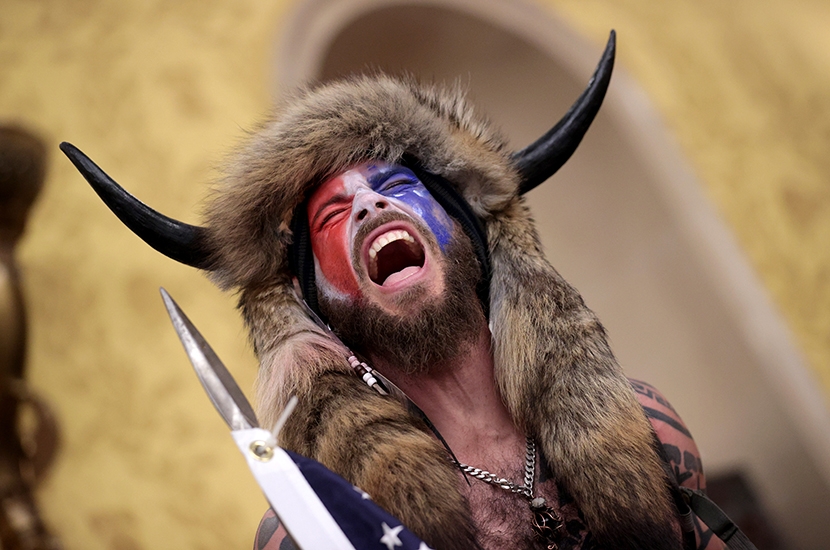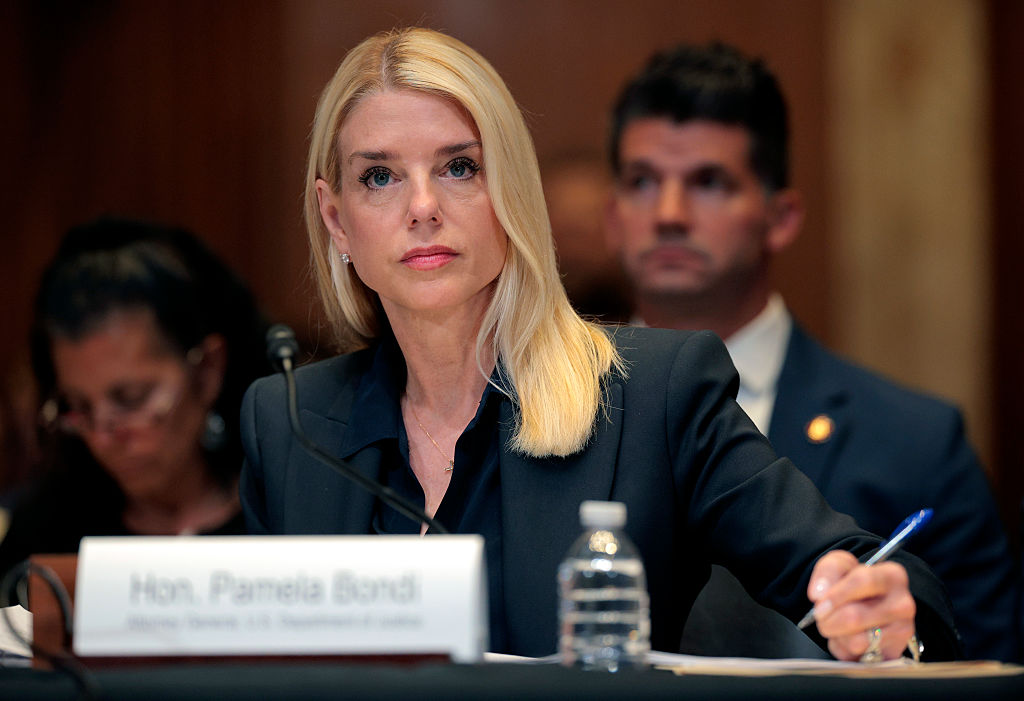There’s something creepy about the way we call Donald Trump fans a cult, then watch them hungrily, hoping they’ll do something colorful, though not actually threatening — like self-immolate, perhaps. Lockdown is boring and we’ve watched everything on Netflix. So, MSNBC and chill.
But not all MAGA fans are cultish, and not all political cults are on the right. 2020 acted like a cult accelerator, and now there are half-brainwashed people everywhere, on every part of the political spectrum, in your family, among your friends. How can you tell? It’s all in the eyes.
It’s famously hard to define a cult. However obviously nutty a group may seem — aliens, polygamists, lizards — some sociologist will rise like a carp and insist it’s a valid new religious movement, and that Christianity is the real cult. So I’d approach it from a different angle. The way to tell if a pal is brainwashed is to examine not their beliefs, but their face. We all believe some eccentric things. I believe in transubstantiation; others swear by homeopathy. But the truly indoctrinated have the distinctive light of revelation in their eyes. They believe there’s a set of secret truths about the universe that only they and their gang are privy to, and that dark forces are working against them.
For MAGA fanatics, that secret truth is the QAnon conspiracy — the theory that an anonymous whistleblower, ‘Q’, has revealed that Trump is on mission to expose an influential cabal of Satanic pedophiles. For devoted anti-vaxxers, it’s the idea that the coronavirus is a ruse to implant trackable microchips in us all, presided over by poor Bill Gates. For the dafter wing of the anti-West gang, the conspiracy goes back to Bronze Age man, who invented the nuclear family as a way of suppressing women.
Being part of an elect, fighting evil, is intoxicating; but because of this, cult-followers find it almost painful to listen to dissent. And so here’s another tell: the twitch of angry impatience if you try to disagree. I spent 1998 drifting around Texas and Louisiana visiting cults, making notes for a book. I never wrote the book, but I did learn the look, and I’m spotting it everywhere now. I saw it in my favorite café just the other day.
‘How are you? How’s it all been? I asked the owner as she passed a cappuccino across the COVID-secure takeaway table. ‘Yeah, you know these are crazy times,’ she replied. ‘But at least everything makes sense now.’ What did she mean? ‘It was all explained to me over the summer, and it’s just mad how much sense it makes! Capitalism, democracy… I just can’t understand how I ever fell for it. The patriarchy have deceived us all. But change will come!’ She laughed, and there it was: the knowing, elated look of the chosen. ‘I’m not sure communism did many people any favors,’ I said. She gave a tight smile, said ‘Yeah. You need to have your eyes opened’, and turned away. When I looked over the road at the estate opposite, the racing clouds made it appear as if the tower blocks were toppling.
If there’s more cult thinking about, the usual explanation for it is the internet. We live in information bubbles, it’s said, constantly reinforcing our own beliefs, each group member egging the others on to more extreme views. But I’m not sure the internet is the real villain here. In fact, it is often the way out of a cult. Steven Hassan, author of The Cult of Trump, is doing the talk show rounds right now, comparing Trump with Sun Myung Moon and David Koresh. Hassan was himself a Moonie for many years, and only escaped, he says, after Google gave him the means to question Mr Moon’s True Way.
The best cult recruiting tool, I think, is simply the terrible global sense of unease. Thanks to the virus, all our carefully constructed ideas of the future are crumbling. We crave certainty, and certainty is what cults do best. If there’s a distinction between a cult and a religion, it’s that certainty is not the same thing as faith. Faith acknowledges doubt and struggles on nonetheless. Certainty is madness.
For the gold-standard crazy cultic certainty, go to YouTube and search for a video made by the Scientologists starring Tom Cruise, in which Tom explains his religion to new recruits, with the Mission: Impossible music in the background. Towards the end of the nine-minute clip, Cruise begins to talk about Scientology’s critics, or Suppressive Persons. ‘SPs?’ Cruise laughs maniacally. ‘Wow. SPs, one day they’ll just read about them in the history books.’ The contempt in which he holds non-believers is astonishing.
And that’s why you can never crack a cultist with argument. The more you argue, the more you try to show them that their thinking might be awry, the more obvious it is to them that you’re part of the diabolical opposition — and that they’re being tested. Persecution only proves the point.
I once spent a few weeks with a Taiwanese UFO cult, Chen Tao, who had moved to Dallas, Texas, in the belief that God was due to arrive there in a spaceship. I was there the evening God was due — March 31, 1998 — and I was there when it became clear God was a no-show. I looked around, expecting to see people weeping, or leaving, or berating their leader. There was none of that. The leader, Chen, even offered to be stoned or crucified, but no one took him up on it. Some members simply stayed. Others left quietly in the following weeks and returned to their lives in Taiwan. And that, I think, is what will happen to the Cult of Trump.
It won’t end with the inauguration. There’s rarely an ‘aha’ moment for cult members — a blinding flash of understanding that they’ve lived a lie. That’s too damaging for the psyche. Trump true believers will be seeing pedos in high places for years to come. Hardcore anti-vaxxers will always look at Bill Gates askance. But slowly, if we resist the temptation to sneer too much and gloat, with any luck, the madness will fade.
This article was originally published in The Spectator’s UK magazine. Subscribe to the US edition here.

























